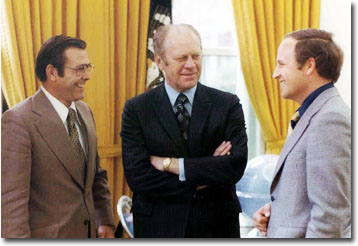
By Bob Schildgen
He was a humble, simple, plain-spoken Midwesterner who courageously pardoned Richard Nixon and healed America's wounds in the wake of Watergate and Vietnam.
Yes indeed, and this is precisely what was most horribly wrong with the man. What the "courageous" pardon of Nixon actually achieved was to amplify a cynicism about politics that proclaims "they're all crooks in cahoots, so why vote?" The Nixon pardon also paved the way for other questionable pardons, like George Bush's pardon of Caspar Weinberger and others of their crimes in the Iran Contra scandal.
Healing and reconciliation were the last thing our country really needed after Watergate and Vietnam. We would've been better off allowing the wounds to fester awhile and engaging in sharper self-criticism and more vigorous debate about our military role. Instead, the forgiving and forgetting made it easier to remilitarize our culture, which led to Ronald Reagan's reckless military spending, renewed zeal for policing the world, and, ultimately, to the Iraq war.
As for Ford's plain-spoken Midwestern humility: We Americans are suckers for it, partly because of a populist suspicion of urban sophistication (which explains all those nasty campaign remarks about elitist cigar-smoking New England liberals and latté-sipping San Franciscans.) Also, simple plain-spokenness appeals to our anti-intellectualism and log-cabin myths about humble roots, while its bland tone comforts those who live in denial of real problems that are worth making noise about. Add all this up, and we find refuge in the very ordinariness of a man like Ford--infatuated with our own banality.
Yet this humble, simple, ordinariness can serve as a perfect cover for all sorts of complicated and wicked intentions. To understand how it works, recall the belief that Ford was both clumsy and stupid. Of course nothing could have been further from the truth. The man made the national college football all-stars and played on two national-championship teams, back in the days when men were men and did both offense and defense. After excelling in sports he went on to get a law degree from Yale--hardly legitimate credentials for a clumsy dolt, and unmatched by almost all presidents. Ford shrewdly played along with such popular nonsense, even dispatching his press secretary Ron Nessen to participate in a silly skit full of bumbling-Ford jokes on Saturday Night Live.
The real joke was on us. It helped us forget or ignore Ford's actual politics. He was a hawk who promoted the Vietnam war, advocating the waste of more lives and money on that adventure than Lyndon Johnson himself. Ford opposed federal aid to education, voted to weaken unions, and fought against minimum wage increases, while dutifully advanced big business interests. He did vote for the Civil Rights Act, only to waffle and back Nixon's attempts to weaken it. In other words, the humble plain-spoken populist did very little for humble plain-spoken people.
In addition to pardoning Nixon, he advanced the careers of numerous hardline militarists, including Dick Cheney his chief of staff and Donald Rumsfeld his secretary of defense. Some commentators have even noted that today's foreign policy is his legacy.
Ford wasn't just a pioneer in pardons. He also tinkered with the impeachment process, which reached its peak absurdity with the Republicans' politically motivated attack on Bill Clinton. While in Congress in 1970, Ford led an attempt to impeach liberal Supreme Court Justice William O. Douglas, obviously motivated by political revenge. Indulging in the divisive partisan politics he's credited with avoiding, Ford went after Douglas to strike back at the Democrats for rejecting two of Nixon's Supreme Court nominees. He also wanted to whack Douglas because the justice had ruled against the Nixon administration on some key issues, most notably the right of the news media to release the Pentagon Papers, which played a major role in building opposition to the Vietnam war. (Some rather scary heirs of such tactics are conservatives like ex-Senator Rick Santorum and ex-House Majority Leader Tom Delay who openly advocate judicial impeachment, not to mention the influential Phyllis Schafly, who has found "good ground of impeachment" of Supreme Court judge Anthony Kennedy because of his ruling against capital punishment for juveniles.)
Now that Ford is dead, we're finding out more about how useful his mask was, and how Pentagon Papers weren't the only things the plain-spoken man was into concealing. In an interview with Bob Woodward in 2004, Ford said that the Bush administration had made a big mistake in justifying the war with Iraq. Unfortunately, Ford required suppression of his critical remarks until he was dead. The solid team player was only loyal enough to the team to refrain from criticizing it while he was alive, apparently not wanting to suffer through denouncement by Bush's people. The only other explanation for his restriction is that Ford thought he'd live forever, and thereby keep his heretical musings secret.
On top of this, it now looks like even the "courageous" pardon of Nixon was as much about doglike love and loyalty to Tricky Dick as it was about healing. "I didn't want my real friend to have the stigma," Ford explains as a motive for the pardon.
So it turns out that the guy was a whole lot more complicated than we thought, and not nearly as nice as we thought, or too nice, or nice for the wrong reasons. Maybe being abandoned by his father had some sort of profound traumatic effect, but let's leave this to the shrinks and psychohistorians to ponder.
No comments:
Post a Comment